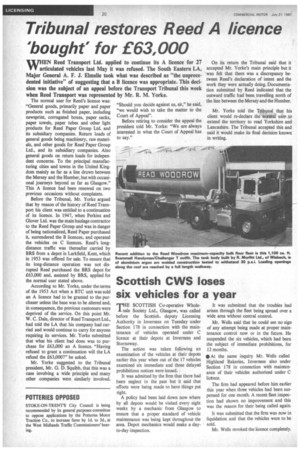Tribunal restores Reed A licence 'bought' for £63,000
Page 22

If you've noticed an error in this article please click here to report it so we can fix it.
VVIN articulated vehicles Transport Ltd. applied to continue its A licence for 27 ticulated vehicles last May it was refused. The South Eastern LA, Major General A. F. J. Elmslie took what was described as "the unprece dented initiative" of suggesting that a B licence was appropriate. This decision was the subject of an appeal before the Transport Tribunal this week
when Reed Transport was represented by Mr. R. M. Yorke.
The normal user for Reed's licence was: "General goods, primarily paper and paper products such as finished paper, including newsprint, corrugated boxes, paper sacks, paper towels, paper tubes and other light products for Reed Paper Group Ltd. and its subsidiary companies. Return loads of general goods being machinery, raw materi als, and other goods for Reed Paper Group Ltd., and its subsidiary companies. Also general goods on return loads for independent concerns. To the principal manufacturing cities and towns in the United Kingdom mainly as far as a line drawn between the Mersey and the Humber, but with occasional journeys beyond as far as Glasgow." This A licence had been renewed on two previous occasions without complaints.
Before the Tribunal, Mr. Yorke argued that by reason of the history of Reed Transport his client was entitled to a continuation of its licence. In 1947, when Perkins and Glover Ltd. was the main haulage contractor to the Reed Paper Group and was in danger of being nationalized, Reed Paper purchased it, surrendered the B licences, and operated the vehicles on C licences. Reed's longdistance traffic was thereafter carried by BRS from a depot in Larkfield, Kent, which in 1953 was offered for sale. To ensure that its long-distance operation was not disrupted Reed purchased the BRS depot for £63,000 and, assisted by BRS, applied for the normal user stated above.
According to Mr. Yorke, under the terms of the 1953 Act when a BTC unit was sold an A licence had to be granted to the purchaser unless the base was to be altered and, in consequence, the previous customers were deprived of the service. On this point Mr. W. C. Dale, director of Reed Transport Ltd., had told the LA that his company had carried and would continue to carry for anyone requiring its services. Mr. Yorke submitted that what his client had done was to purchase for £63,000 an A licence. "Having refused to grant a continuation will the LA refund the £63,000?" he asked.
Mr. Yorke suggested to the Tribunal president, Mr. G. D. Squibb, that this was a case involving a wide principle and many other companies were similarly involved. "Should you decide against us, sir," he said, "we would wish to take the matter to the Court of Appeal".
Before retiring to consider the appeal the president told Mr. Yorke: "We are always interested in what the Court of Appeal has to say." On its return the Tribunal said that it accepted Mr. Yorke's main principle but it was felt that there was a discrepancy between Reed's declaration of intent and the work they were actually doing. Documentation submitted by Reed indicated that the outward traffic had been travelling north of the line between the Mersey and the Humber.
Mr. Yorke told the Tribunal that his client would re-declare the normal user to extend the territory to read Yorkshire and Lancashire. The Tribunal accepted this and said it would make its final decision known in writing.












































































































